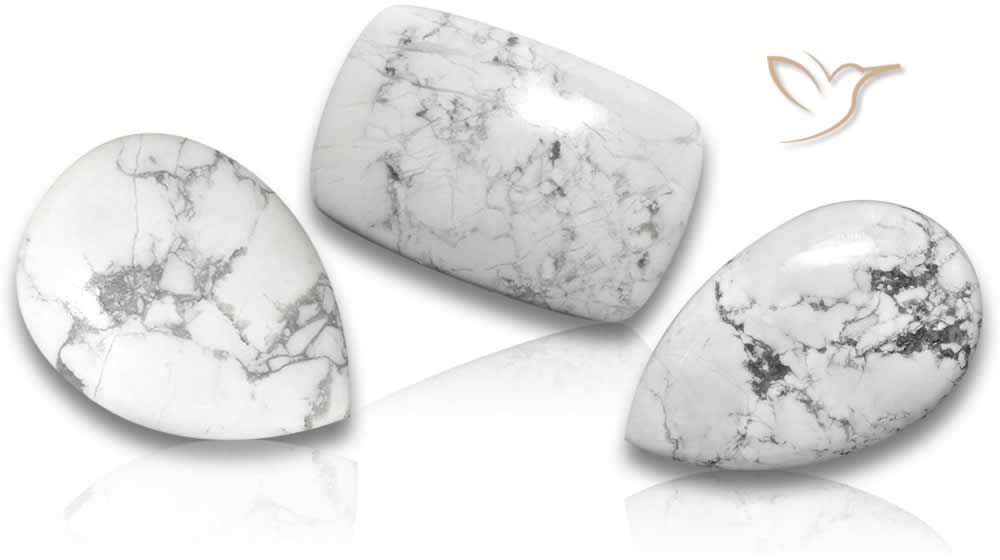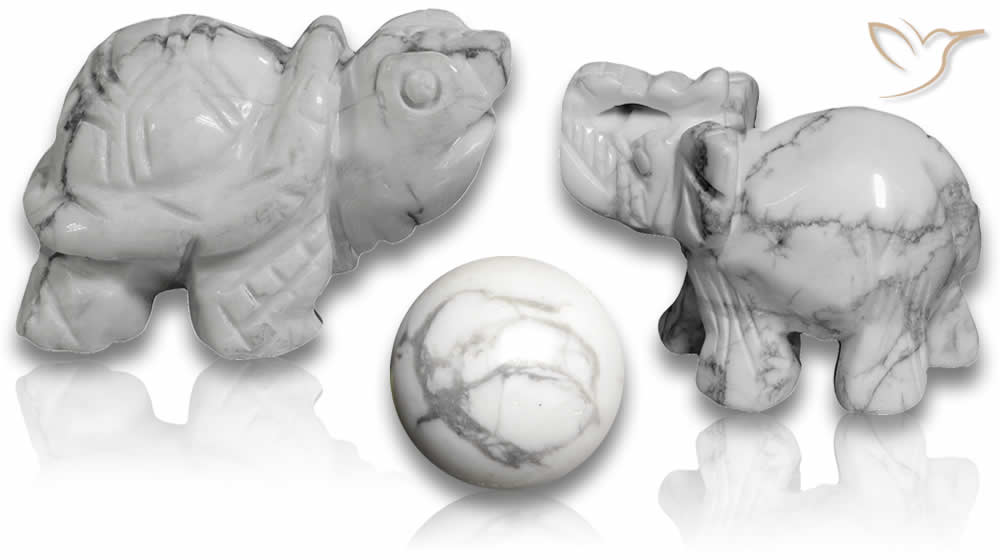Howlite Gemstone Information: Your Essential Guide

Howlite is a fascinating gemstone known for its striking appearance and calming properties. With its soft, white base often veined with striking grey or black lines, howlite resembles marble, making it a popular choice for both jewelry and decorative items. Beyond its aesthetic appeal, howlite is valued in the metaphysical community for its purported ability to promote relaxation, alleviate stress, and enhance communication. In this article, we will delve into the origins, characteristics, and uses of howlite, uncovering the allure of this unique stone and its significance in both beauty and wellness. Browse through our howlite gemstones for sale.
Key Highlights:
- Howlite is a beautiful gemstone that has unique properties and metaphysical characteristics
- It is often used in jewelry and home decor due to its versatility and appeal
- Howlite has healing properties that can help promote emotional well-being
- Proper care and maintenance are essential to keep your Howlite gemstone looking beautiful for years to come
Understanding Howlite: Origins and Meanings
At its core, Howlite is an ultra-soft, opaque, and white gemstone that was first discovered in Canada by Henry How in the 19th century. However, the gemstone is now found in different countries around the world including the USA, Mexico, and Russia. This unique gemstone has a fascinating history and holds great importance in different cultures, symbolisms, and spiritualities.
Origins of Howlite Gemstone
Howlite's discovery in Canada is a result of the work of a mining mineralogist, Henry How. While searching for silver deposits, How came across an unusual rock with white nodules that were different from any stone he had ever seen. How did not publish his findings, but it was his friend, James Dwight Dana, who in 1868 declared the mineral "Howlite" in his honor.
Historical and Cultural Associations
The Howlite gemstone has a long history of use among different communities. Egyptians used Howlite to make jewelry and decorative objects, while Native Americans traditionally used it to form small sculptures and sacred objects. In the Chinese culture, Howlite is believed to stimulate wisdom and communication and aid in emotional awareness.
Symbolic Meanings
In various spiritual practices, howlite meaning varies significantly; for example, in the yogic tradition, howlite symbolizes calmness and is thought to aid individuals in achieving a meditative state. Furthermore, howlite is commonly viewed as the stone of awareness, believed to promote emotional healing and foster personal growth.
Properties of Howlite Gemstone
Howlite is a fascinating gemstone with unique properties that make it highly sought-after in the world of jewelry and crystal healing. Here are some of the key physical and metaphysical characteristics that define Howlite:
| Property | Description |
|---|---|
| Chemical Composition | Howlite is a calcium borosilicate hydroxide mineral that is often found in metamorphic rock formations. It has a chemical formula of Ca2B5SiO9(OH)5. |
| Hardness | Howlite has a Mohs hardness rating of 3.5, which makes it a relatively soft gemstone. It is important to handle Howlite with care to avoid scratching or chipping it. |
| Color Variations | Howlite is typically white or cream-colored with dark grey or black veining. However, it can also be dyed to mimic other gemstones, such as turquoise or lapis lazuli. |
| Metaphysical Properties | Howlite is known for its calming and soothing energy. It is said to relieve stress, anxiety, and tension, and promote emotional well-being. Howlite is also believed to aid in spiritual journeying and enhance communication with higher realms. |
In addition to its unique physical and metaphysical properties, Howlite is also frequently used in jewelry and decorative objects due to its distinctive appearance. Its white or cream color and striking veining make it a versatile and eye-catching gemstone that is easily incorporated into a variety of styles and designs.
Howlite Uses: From Jewelry to Home Decor
Howlite is a versatile stone that can be used to create beautiful jewelry pieces or incorporated into stunning home decor items. Here are some of the ways you can use Howlite:
Jewelry
Howlite gemstone can be used to create a variety of stunning jewelry pieces. Its subtle white color pairs well with other gemstones and metals, making it a popular choice for both minimalist and statement pieces. Here are some ways you can incorporate Howlite into your jewelry collection:
- Create a simple yet elegant Howlite pendant necklace
- Add Howlite beads to your favorite bracelets
- Create stunning Howlite hoop earrings
Home Decor
Howlite stone is also a popular choice for home decor pieces. Its unique and eye-catching pattern makes a great accent for any room. Here are some ways you can incorporate Howlite into your home decor:
- Create a Howlite and copper wind chime
- Add Howlite coasters to your dining table
- Create stunning bookends with Howlite pieces
Whether you choose to use Howlite for jewelry or home decor, this gemstone is sure to give off a sense of calm and serenity.
Healing Properties and Benefits of Howlite Gemstone
Howlite is not only a visually stunning gemstone, but it also offers a range of healing properties and benefits. Understanding the properties of this gemstone can help you harness its energies to promote physical and emotional well-being.
| Benefits | Healing Properties |
|---|---|
| Calming and Soothing | Known for its calming energies that reduce anxiety, stress and tension. It is also believed to help soothe an overactive mind, promote sound sleep and improve insomnia. |
| Positive Attitude | Howlite is believed to inspire its wearer towards a positive attitude and perspective, bringing in constructive and uplifting thoughts, combating self-criticism and other negative traits. |
| Mental and Spiritual Awareness | A stone that helps increase self-awareness, Howlite is beneficial for meditation and spiritual exploration. It helps enhance inner peace, focusing the mind on its potential to open up newer dimensions of spiritual growth. |
| Strong Bones and Teeth | Howlite is often used to help with calcium deficiencies and problems with the bones and teeth, strengthening them and promoting overall wellness of the body. |
Howlite gemstone is also said to harmonize the energy of the body, encouraging a state of balance for the body, mind, and spirit, promoting optimal health. So whether you are looking to reduce stress levels, improve your sleep hygiene, or seeking mental clarity - Howlite will help you revitalize yourself.
Caring for Howlite Gemstone: Tips and Maintenance
Howlite is a relatively soft gemstone that requires proper care and maintenance to preserve its beauty and longevity. To ensure that your Howlite gemstone jewelry remains in top condition, follow these useful tips:
Cleaning Tips
Clean your Howlite gemstone regularly with a soft, damp cloth to remove dust and dirt accumulation. Avoid using abrasive cleaners, harsh chemicals, or ultrasonic cleaners, as they can scratch or damage the gemstone's surface. You can also use a mild soap solution to clean the gemstone, but make sure to rinse thoroughly and dry immediately.
Storage Tips
Always store your Howlite gemstone jewelry separately from other jewelry pieces to prevent scratches or damage. You can use a jewelry pouch or box or wrap the gemstone in a soft cloth. Avoid storing the jewelry in a humid or damp place, as this can cause discoloration or damage to the gemstone.

Protection Tips
Howlite is relatively soft and can easily scratch or chip. Avoid wearing your Howlite jewelry during activities that may expose it to harsh impact or pressure, like sports activities, household chores, or gardening. Remove your Howlite jewelry before applying makeup, perfumes, or hair products, as they can cause discoloration or damage to the gemstone.
Maintenance Tips
Inspect your Howlite gemstone jewelry regularly for any signs of damage or wear and tear. Look for loose settings, cracks, or chips. If you notice any issues, take your jewelry to a professional jeweler for repair. It is also recommended to have your Howlite gemstone jewelry professionally cleaned and polished at least once a year to maintain its luster and shine.
Conclusion
As we conclude our comprehensive guide to Howlite Gemstone, we hope you have gained valuable insights into its properties, meanings, origins, and uses. We believe that Howlite is more than just a beautiful gemstone, it has a rich cultural and historical significance that makes it a unique addition to your jewelry collection.
Its versatile applications in jewelry and home decor, combined with its healing properties, make it a popular choice among gemstone enthusiasts. With proper care and maintenance, Howlite gemstone can last a lifetime, and continue to provide you with its spiritual and emotional benefits.
At the end of the day, it is up to you to decide how to incorporate Howlite gemstone into your life. Whether you wear it as jewelry, use it for meditation, or display it as a decorative piece, we are sure that Howlite will bring you joy, peace, and prosperity.
FAQ
What is Howlite gemstone?
Howlite is a calcium borosilicate hydroxide mineral that is often used as a gemstone due to its unique and beautiful appearance.
Where does Howlite gemstone come from?
Howlite is primarily found in North America, particularly in Canada and the United States.
What are the properties of Howlite gemstone?
Howlite is known for its white or light grey color with fine gray or black veins. It has a Mohs hardness of 3.5 and is often used as a substitute for more expensive gemstones.
What are the meanings associated with Howlite gemstone?
Howlite is believed to have calming and soothing energies, helping to reduce stress and anxiety. It is also associated with enhancing communication and promoting a calm and peaceful mind.
In what ways can Howlite gemstone be used?
Howlite gemstone is commonly used in jewelry, including necklaces, bracelets, and earrings. It is also used in home decor items such as figurines and coasters.
What are the healing properties and benefits of Howlite gemstone?
Howlite is believed to have a calming effect on the mind and can help with insomnia and sleep disturbances. It is also associated with emotional healing, stress relief, and promoting a sense of peace and tranquility.
How should I care for my Howlite gemstone?
To care for your Howlite gemstone, it is recommended to avoid exposing it to harsh chemicals, extreme temperatures, and direct sunlight. Clean it gently with a soft cloth and store it in a separate pouch or compartment to prevent scratching.

